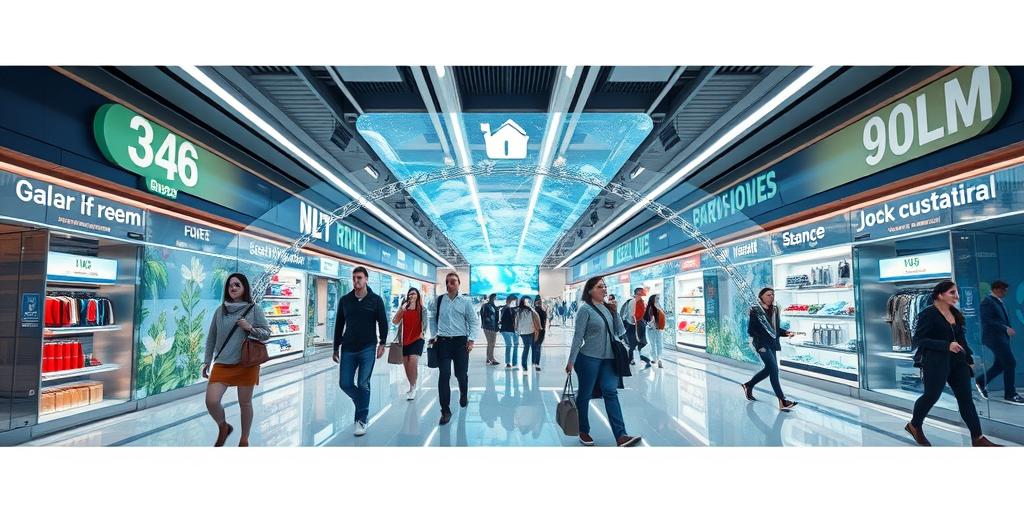The Future of Retail: Global Trends in 2025
The retail landscape is in constant flux, driven by technological advancements, evolving consumer behaviors, and global economic shifts. As we look toward 2025, several key trends are poised to reshape the industry. This article provides an informative overview of these trends, offering insights into how retailers can prepare for the future.
1. Enhanced Personalization Through AI
Artificial intelligence (AI) is already making waves in retail, and its influence will only grow stronger. By 2025, AI-powered personalization will be the norm. Retailers will leverage AI to analyze vast amounts of customer data, providing tailored product recommendations, personalized marketing messages, and customized shopping experiences. This level of personalization will extend beyond online channels, influencing in-store layouts, product placement, and even employee interactions.
- Predictive Analytics: AI algorithms will predict future purchasing behavior based on past transactions and browsing history.
- Dynamic Pricing: Real-time adjustments to pricing based on demand, competitor pricing, and individual customer profiles.
- Personalized Recommendations: Suggesting products that align with each customer’s unique preferences and needs.
2. The Rise of Omnichannel Retail
Omnichannel retail, which seamlessly integrates online and offline shopping experiences, will become even more sophisticated. Consumers expect to interact with retailers across multiple touchpoints, whether it’s browsing online, visiting a physical store, or using a mobile app. The key to success will be creating a consistent and cohesive brand experience across all channels.
- Unified Inventory Management: Real-time visibility of inventory across all locations.
- Click-and-Collect Services: Allowing customers to order online and pick up in-store.
- Mobile Integration: Using mobile apps to enhance the in-store shopping experience with features like mobile payments and augmented reality.
3. Sustainable and Ethical Practices
Consumers are increasingly concerned about the environmental and social impact of their purchases. Retailers that prioritize sustainability and ethical practices will gain a competitive advantage. This includes reducing waste, using eco-friendly materials, ensuring fair labor practices, and promoting transparency in the supply chain.
- Eco-Friendly Packaging: Reducing plastic use and adopting recyclable or biodegradable materials.
- Sustainable Sourcing: Partnering with suppliers who adhere to ethical and environmental standards.
- Transparency in the Supply Chain: Providing customers with information about the origin and production of products.
4. The Continued Growth of E-Commerce
E-commerce will continue its upward trajectory, driven by convenience, wider product selection, and enhanced online shopping experiences. Retailers must invest in their online platforms to meet the growing demands of digital consumers.
- Mobile-First Approach: Optimizing websites and apps for mobile devices.
- Improved User Experience: Streamlining the online shopping process with intuitive navigation and easy checkout.
- Advanced Search Functionality: Helping customers find products quickly and easily.
5. The Metaverse and Virtual Shopping
The metaverse presents new opportunities for retailers to engage with customers in immersive and interactive ways. Virtual stores, augmented reality (AR) shopping experiences, and virtual fashion shows will become more common.
- Virtual Showrooms: Allowing customers to explore products in a virtual environment.
- AR Shopping: Enabling customers to visualize how products will look in their homes or on their bodies.
- Gamified Shopping Experiences: Engaging customers through interactive games and challenges.
Conclusion
The future of retail in 2025 will be shaped by technological innovation, changing consumer preferences, and a growing emphasis on sustainability. Retailers that embrace these trends and adapt their strategies accordingly will be well-positioned to thrive in the evolving marketplace. By focusing on personalization, omnichannel integration, sustainability, e-commerce enhancements, and metaverse opportunities, retailers can create compelling and engaging shopping experiences that meet the needs of the modern consumer.
